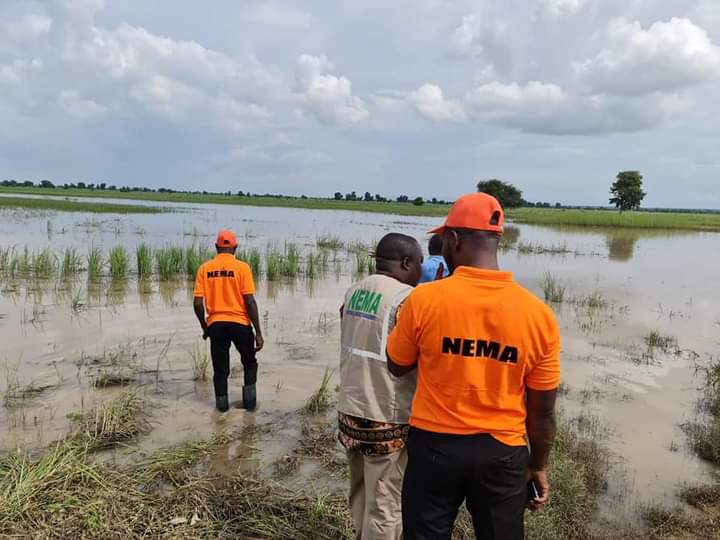-
Okays Renewed Hope creative villages in states
From Juliana Taiwo-Obalonye, Abuja
The National Executive Council (NEC), presided over by Vice President Kashim Shettima, met on Thursday to discuss pressing environmental challenges in Nigeria.
Akwa Ibom Deputy Governor, Akon Eyakenyi, who briefed State House Correspondents, provided a comprehensive update on the ad hoc committee focused on flood, erosion, drought, and desertification, chaired by Kogi State Governor Ahmed Ododo.
Eyakenyi reported that the committee has successfully implemented several recommendations, particularly concerning financial assistance to states grappling with flood issues.
She said the council resolved to conclude the committee’s activities, transferring responsibilities to a task force dedicated to ongoing flood and erosion mitigation efforts.
The Akwa Ibom Deputy Governor added that NEC approved the disbursement of remaining funds allocated for flood mitigation initiatives, emphasising the need for continued support for affected states.
She said: “Another important update that was discussed, deliberated on the ad hoc committee on flood, erosion, drought and desertification, which is the committee chaired by the Kogi State Governor and Governor, the chairman of NEC and Adhoc Committee Chairman governor of Kogi state, gave an update report on the committee’s activities and noted the implementation of some of the recommendations made by the committee, especially the provision of financial support to states and disbursements of funds to the line ministries and the agencies of government, to address flood issues in the various states.”
Continuing, Eyakenyi said, “The chairman of the committee prayed that the council should approve the winding down all the committee’s activities because the final report was submitted, and also to transfer the duties to the task force on flood, erosion, drought and mitigation agencies.
“The resolution of the Council today after deliberation, was that council noted all the players of the committee and also commended The Chairman and members for discharging their tax dutifully and approved the recommendations for the disbursement of the balance of the funds approved for MDAs for the Flood Mitigation and other related activities.”
Lagos State Governor, Babajide Sanwo-Olu, approved an ambitious initiative aimed at transforming historic sites into vibrant cultural hubs during a recent meeting with the National Executive Council (NEC).
The presentation, delivered by the Ministry of Arts, Culture, Tourism, and Creative Economy, outlined plans to establish “Renewed Hope Creative Villages” across the state.
“This is a unique opportunity for us to harness the power of creativity in our historic locations,” Sanwo-Olu remarked.
He emphasised the importance of collaboration with sub-national governments to identify and adopt significant sites for this initiative. The governor noted that these creative villages would serve as one-stop shops for artists and entrepreneurs, enhancing visibility and viability for local talent.
The initiative aims to not only protect these historic sites but also to generate jobs and boost revenue through cultural tourism. “We believe this will create jobs and enhance revenue generation for both local communities and the government,” Sanwo-Olu added.
He highlighted the potential of these villages to host year-round events, providing educational opportunities for young people eager to learn about their heritage.
The council commended the ministry’s exhaustive presentation and acknowledged the need for stronger synergy between state and federal levels to support this initiative. “It is crucial that we provide adequate budgetary support to ensure the success of these projects,” Sanwo-Olu concluded, underscoring a unanimous agreement among council members on the importance of investing in Nigeria’s creative sector.
The Permanent Secretary of Budget and Economic Planning, Obi Vitalis, said NEC also discussed the Human Capital Opportunities for Prosperity and Equality (HOPE) project, aimed at enhancing human capital through improved governance and service delivery in education and healthcare.
Key outcomes include increased transparency in fund allocation, hiring qualified personnel, and addressing foundational service constraints.
He said the World Bank has approved $500 million for the HOPE-GOV initiative, with further approvals expected for HOPE-EDU in March 2025.
The NEC acknowledged the importance of human capital development initiatives under the HOPE project, recognising their potential benefits for all sub-national entities, given Nigeria’s extensive challenges in these sectors.
The Vice President underscored that this initiative represents a “golden opportunity” for states to revitalise their healthcare delivery systems and educational sectors. He urged all state governments to actively engage with the programme by nominating focal persons who can drive its implementation locally.
States interested in participating in the HOPE project are required to submit an Expression of Interest (EOI) letter to the Federal Ministry of Finance (FMoF), along with copies to relevant sectoral ministries and the World Bank. Several states have already submitted their EOIs, demonstrating early engagement with the initiative.
